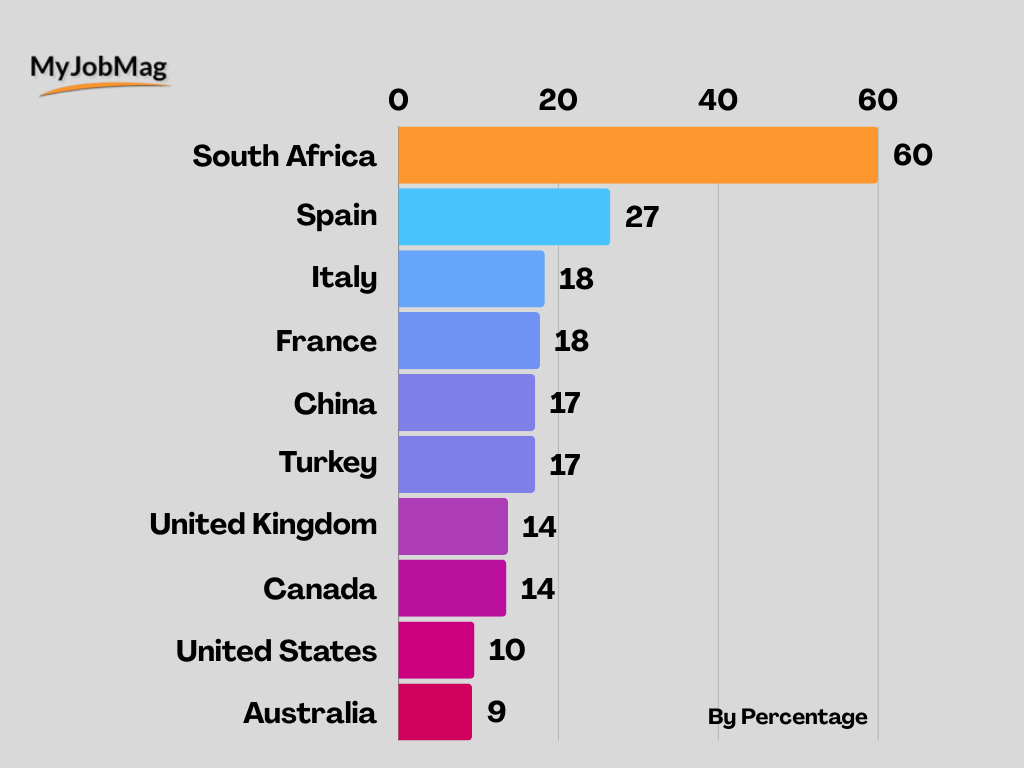
While the global economy has made substantial strides in job creation since the pandemic's peak, the recovery remains uneven. Youth unemployment, in particular, persists at troubling levels, as young people continue to face significant barriers in accessing stable, long-term employment opportunities.
According to the Spectator Index, South Africa has the highest youth unemployment rate in the world with 60.2% of its youth populace being unemployed. It is followed by Spain (26.5%)‚ Italy (18.3%)‚ France (17.7%), and China (17.1%).
Countries With the Highest Youth Unemployment Rate
Note: The unemployed young people are those between the ages of 15-24 without gainful employment.
Using the date above, here is a table to demonstrate the percentage of each country’s youth unemployment rate:

Interestingly, South Africa is the only African country on the Spectator Index's list. Limited educational opportunities, including social and economic disadvantages, are the key drivers behind unemployment in the Ramaphosa-led economy.
Top Reasons for Youth Unemployment:
In addition to the absence of educational qualifications and the right skills that are requirements of the labour market, the following factors are responsible for the high rate of youth unemployment:
The presence or absence of economic growth and development directly impacts the labour market. The more opportunities that exist, the more jobs will be available and unemployment reduced. Conversely, economic contraction leads to an increase in joblessness.
Noticeably, young workers are frequently observed as the most unimportant. They are seen as most disposable because they typically lack experience and as a result, they are the most hit by financial crisis.
This is also known as geographical unemployment. It is caused by parts of a country developing at an unequal rate. While certain areas naturally attract more economic opportunities than others, when the disparity becomes too great, it is often young people who bear the brunt of its consequences.
In cases where they migrate for better opportunities, they tend to oversaturate the (relatively) economically successful area. This is most common in Africa and parts of the Middle East.
Many young people have the expectation of securing a significant job which gives a 'living pay'. They likewise face quite certain obstructions in the work market, where there are issues with incorporating young people into workplaces.
Some workplaces have also failed to cater to the compelling flexibility of young job seekers. As a result, many of them are unwilling the take up the available jobs. Thus, leaving them to navigate between joblessness, training, temporary and insecure employment.
In addition to young people bearing the brunt of economic downturns, there is a group that bears it even more – girls and young women. The majority of the over 621 million young people the OECD reports as unemployed are women.
This is particularly worse in North Africa and the Middle East where the female youth unemployment rate is almost double that of young men, going as high as 44.3 and 44.1%, respectively.
Conclusion
The World Economic Forum theorizes that to improve youth employment prospects, countries need to provide better and more focused education, provide better assistance to the workplace and boost job creation.
Leave a Comment